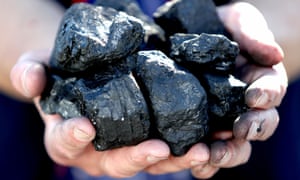If the country doubles its coal production, the Paris climate agreement goals cannot be met
António Guterres is this week hosting a major gathering
of world leaders in an attempt to accelerate global action on climate
change. The UN secretary general has made tackling fossil fuels, and
especially coal, central to the summit’s success. He has urged governments to stop permitting new coal-fired power stations to be built and to phase out subsidies for fossil fuels.
In this context, the countries that are subsidising and facilitating the expansion of coal, oil and gas production merit just as much critical scrutiny as those that are burning these fuels. Just as it would be wrong to tackle smoking by focusing only on smokers and ignoring the efforts of Big Tobacco, it is wrong to tackle the global fossil fuel addiction by ignoring the countries that deal heavily in the product. It’s wrong to tackle the global fossil fuel addiction by ignoring the countries that deal heavily in the product.
When it comes to global fossil fuel dealers, Australia is a kingpin. It is the world’s largest coal exporter,
having captured a larger share of the global seaborne coal market than
Saudi Arabia has of the global oil market. Australia is the largest
liquefied natural gas exporter, too. From 2000 to 2015, Australian coal exports more than doubled and LNG exports tripled, and since then LNG exports have nearly tripled again.In this context, the countries that are subsidising and facilitating the expansion of coal, oil and gas production merit just as much critical scrutiny as those that are burning these fuels. Just as it would be wrong to tackle smoking by focusing only on smokers and ignoring the efforts of Big Tobacco, it is wrong to tackle the global fossil fuel addiction by ignoring the countries that deal heavily in the product. It’s wrong to tackle the global fossil fuel addiction by ignoring the countries that deal heavily in the product.
When you tally the greenhouse gases from the fossil fuels exported by each country, Australia’s coal and gas exports total over 1.1bn tonnes of carbon dioxide – more than double its domestic emissions – making it the world’s third largest exporter of fossil carbon, behind only Saudi Arabia and Russia.
You might wonder, then, why so little diplomatic attention is focused on Australia. It’s a testament to the effectiveness of Australia’s assiduous diplomatic efforts on behalf of the fossil fuel industry. Not only does Australia encourage other countries to buy its toxic coal and gas, but it works tirelessly in international forums including the G20 and the UN climate system to ensure that its huge fossil fuel exports are not discussed, let alone criticised.
Australia’s conservative prime minister, Scott Morrison, is notably absent from this week’s climate summit. Despite being in the US anyway to dine with President Donald Trump at the White House, Morrison declined to attend the summit because his government has no new climate commitments to announce.
Far from increasing its paltry commitments to climate action, Australia is continuing to ramp up its fossil fuel production, mostly for export. With 53 coalmines proposed, Australia wants to double its existing production again by 2030, aspiring to be the supplier of choice to fuel a proposed new wave of power stations in Asia. It is expanding its LNG production, too, with numerous large projects finishing construction and 19 proposals for projects or expansions.
The implication is simple: if Australia achieves its planned fossil fuel expansion, the world cannot achieve the climate goals of the Paris agreement. Part of the response must involve curtailing the market into which Australia is selling its product. That means ensuring that new power stations in Asia are non-fossil fuel and that steel is increasingly produced sustainably, rather than from traditional methods that use coking coal.
But economics 101 tells us that the greater the quantity of a product that is supplied into a market, the lower its price, and the lower its price the more attractive to buyers it will be than substitute products. That’s why fossil carbon has to be cut with both arms of the scissors – with measures to regulate both demand and supply.
Other governments, powerful companies and mass social movements must therefore ratchet up the pressure on Australia to ban new fossil fuel production and instead mandate an orderly phase-out of its existing production. They must add their voices and their support to the millions of Australians who want their government to be a responsible global leader in staving off the climatic breakdown that is already wreaking havoc in Australia, to say nothing of its Pacific island neighbours and beyond.
There’s nothing new about the idea of regulating the supply of dangerous products. Australia itself, for example, is a world leader in tobacco control, with scores of regulations targeting the supply of cigarettes and their consumption. Globally, treaties regulate the supply of and international trade in uranium, asbestos, hazardous waste, ozone-depleting gases and dangerous weapons.
Fossil fuel power stations are catastrophically dangerous weapons and fossil fuels are their ammunition. It’s high time the rest of the world treated Australia like the carbon kingpin it is.
- Richie Merzian is climate and energy director at the independent thinktank the Australia Institute. Fergus Green will be a postdoctoral research fellow at the Ethics Institute at the University of Utrecht from 1 November 2019

No comments:
Post a Comment